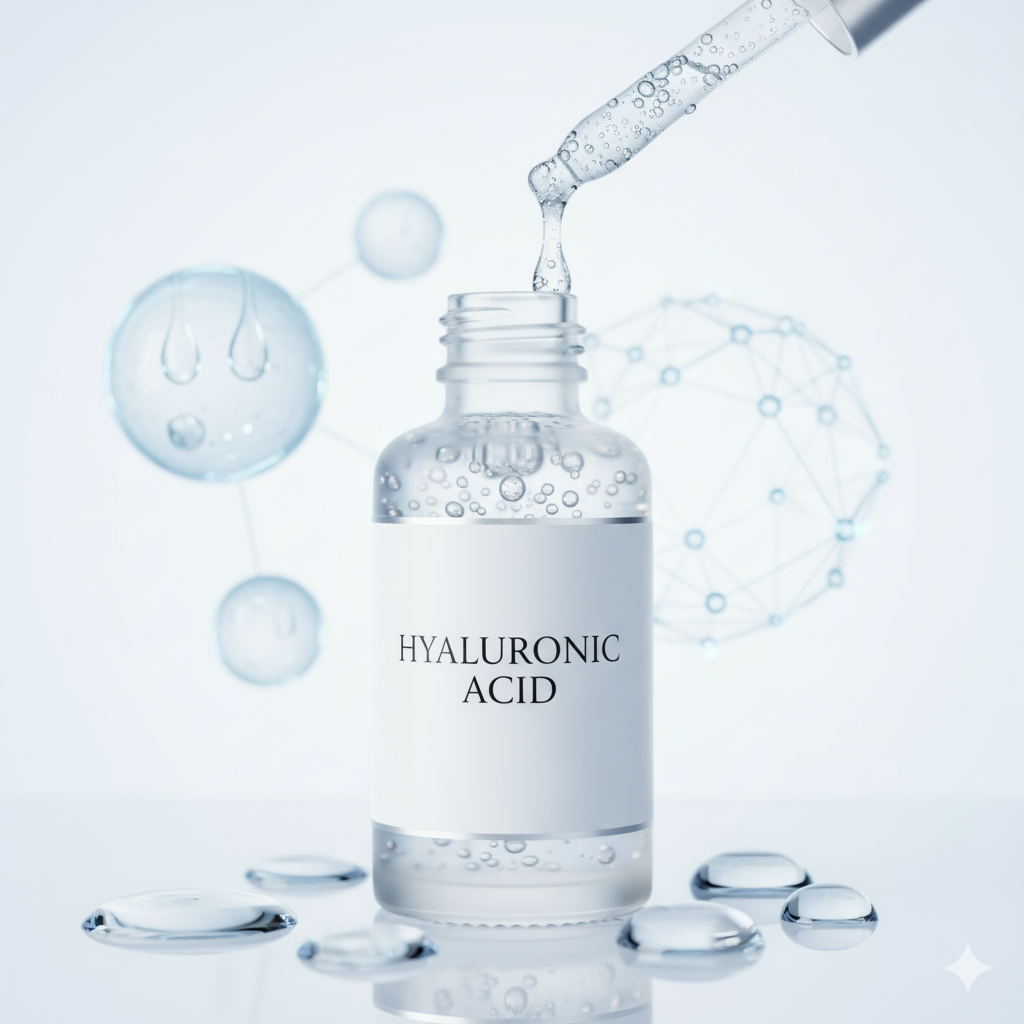
What Hyaluronic Acid Really Does for Your Skin
Hyaluronic acid is now among the most loved and used skincare ingredients, and regularly prescribed by dermatologists due to its exclusive capacity to hydrate, plump, and protect the skin. This acid is crucial to maintaining a healthy skin barrier, whether you have dry, oily, sensitive, or combination skin. Hyaluronic acid has become a celeb ingredient in most skincare regimes and comes in the form of serums, creams, and a lot more.
This guide will take a look at hyaluronic acid, its working, the advantages of using it regularly, when to apply it, and why it can be applied to all types of skin.

What is Hyaluronic Acid?
Naturally occurring substance, Hyaluronic acid is a type of sugar molecule (glycosaminoglycan) that is naturally present in the skin, in the eyes, and in the connective tissues. Due to its vast benefits for the skin, it's widely popular in the cosmetic industry. Here are some of the unique properties of Hyaluronic acid:
● Moisture-binding capacity: It has the capacity to withstand 1000 times its own weight of water and is a strong hydrator.
● Skin health benefit: It prevents skin hardness, stiffness, and roughness.
● Age regression: The natural levels of hyaluronic acid in the skin naturally decline with age, which is why topical application becomes a necessity rather than just a beauty treatment.
● Hyaluronic acid serum, hyaluronic acid cream, and even body care products are now available with this as the hero ingredient to replenish skin hydration.
How Hyaluronic Acid Benefits the Skin
Hyaluronic acid has also been widely acclaimed to have several skincare advantages:
● Intensive hydration: Hyaluronic acid hydrates all the layers of skin, making it plump and soft.
● Increased elasticity: Gives skin the natural bounce it needs and reduces sagging.
● Fewer wrinkles: Water naturally smoothes wrinkles and fine lines.
● Barrier protection: Helps in strengthening the skin's natural barrier against pollutants and irritants.
● Non-comedogenic: Causes no pore congestion, and thus it can be used safely for acne-prone skin.
● Compatibility: Works well with other active ingredients such as niacinamide, peptides, and vitamin C.
Dermatologists also advise using hyaluronic acid for skin with a moisturiser to lock in the hydration and make skin plump and healthy.
When to Use Hyaluronic Acid in Your Skincare Routine
Hyaluronic Acid for Daytime Skincare
Hyaluronic Acid Daytime Skin Care:
● Lightweight hydration: Hyaluronic acid serum, if used in the morning, will keep your skin full of life all day long.
● Layer-friendly: Use after cleansing face with a gentle cleanser and under sunscreen to keep your skin healthy.
● Works-SPF: Hyaluronic acid, when combined with sun protection, fights dehydration and premature aging caused by the harmful UV rays of the sun.
● Fits makeup wearers: The light texture of this formulation makes an easy and ideal base for foundation.
Hyaluronic Acid for Nighttime Skincare
Hyaluronic Acid Night Skin Care:
● Overnight repair: During the night, the skin goes into repair mode, and hyaluronic acid cream enhances water retention to repair skin and lock in hydration.
● Add retinol: By combining it with retinol, it decreases any form of dryness and irritation.
● Intense moisture: Using a heavier or thicker cream provides long-lasting hydration during sleep.
● Barrier strengthening: Using hyaluronic acid at night helps repair the environmental stress.
Where to Find Hyaluronic Acid in Skincare Products
Hyaluronic acid is present in various types:
● Hyaluronic acid serums: Light-weight and quick-absorbing, they are suitable for targeting hydration.
● Hyaluronic acid creams: These are thicker creams that trap moisture.
● Hyaluronic acid moisturizers: Offer hydration and extra-nourishing properties.
● Cleansers and toners: Hydrating cleansers make sure that your skin is never stripped dry.
● Body lotions: Hyaluronic acid body lotion refreshes dry skin, such as the elbows, knees, and heels.
● Dermatologists hint: When choosing products, check the label for the molecular weight of hyaluronic acid in the product to ensure your skin is hydrated even at various depths.
Why Hyaluronic Acid is Suitable for All Skin Types
● Dry skin: Gives skin much-needed moisture and relief from tightness.
● Oily skin: It is lightweight and oil-free, and hence it does not make skin oily and greasy.
● Sensitive skin: Soft, non-irritating, and approved by millions of dermatologists.
● Aging Skin: Hyaluronic acid for aging skin fills up the fine lines and helps restore elasticity.
● Combinational skin: Hyaluronic acid is perfect for combinational skin as it balances the hydration without overloading oily zones on the skin.
This is why hyaluronic acid is one of the safest and most helpful factors in skincare.
Conclusion
Hyaluronic acid is not merely a skin hydration booster; it is one of the pillars of contemporary skin care. Choosing hyaluronic acid serum to hydrate is a crucial part of maintaining your skin healthy, full, and radiant.
Dermatologists recommend the use of hyaluronic acid regularly in combination with a sunscreen for sun protection and other restorative substances to achieve the best results. In case of sensitive skin or skin with special needs, it is safer to select the dermatologist-suggested product, such as Cetaphil optimal hydration serum, optimal hydration night cream, to get smooth and healthy skin.
FAQs
How does hyaluronic acid compare to other hydrating ingredients?
Hyaluronic acid stands out because it can hold up to 1,000 times its weight in water. Unlike glycerin or aloe vera, it provides multi-layer hydration, plumps the skin, and strengthens the barrier without greasiness.
Can hyaluronic acid cause breakouts or skin irritation?
Hyaluronic acid is generally non-comedogenic and safe for most skin types. Breakouts or irritation are rare, usually caused by added fragrances or unsuitable formulations. Dermatologist-recommended options, like Cetaphil’s hyaluronic acid products, minimize this risk effectively.
Is it safe to use hyaluronic acid with other active ingredients?
Yes, hyaluronic acid pairs safely with most actives, including retinol, niacinamide, and vitamin C. It enhances absorption, reduces irritation risk, and provides hydration, making it an excellent companion to stronger skincare ingredients.
How often should I use hyaluronic acid products?
Hyaluronic acid can be applied twice daily, morning and evening, for optimal hydration. Consistent use maintains skin moisture, plumpness, and elasticity. Dermatologists recommend incorporating it into both your daytime and nighttime skincare routines.
What is the best way to apply hyaluronic acid for maximum effectiveness?
Apply hyaluronic acid on slightly damp skin after cleansing. Follow immediately with a moisturizer or cream to lock in hydration. This ensures water-binding action works effectively, leaving skin plump, smooth, and deeply nourished.














